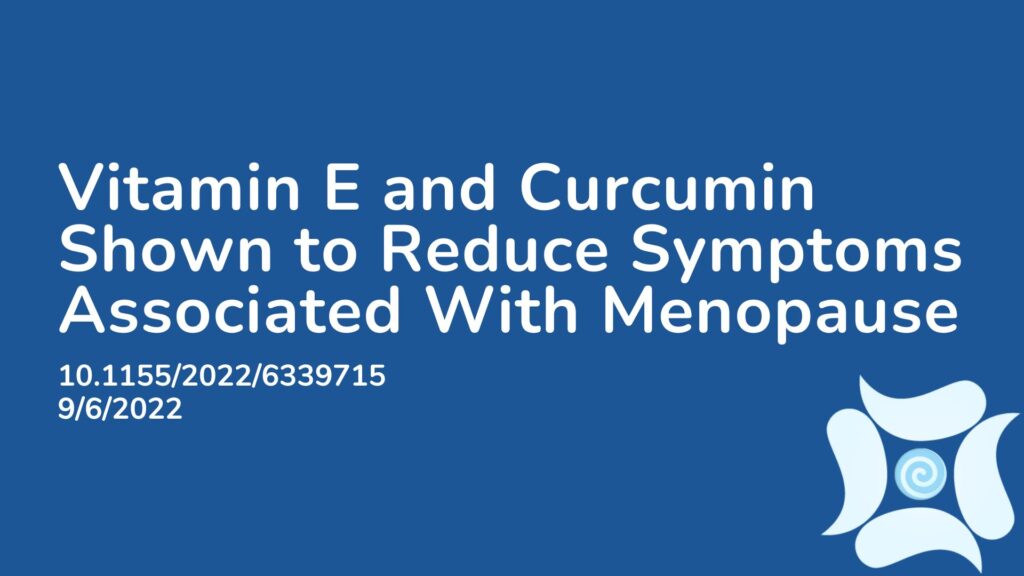Summary:
The reduction of estrogen levels seen in menopause can cause an inflammatory cascade, anxiety and sexual dysfunction. The researchers of this paper looked at curcumin and vitamin E due to their anti-inflammatory and antioxidant activity to see if they could be used as an alternative treatment for menopausal symptoms. The study is a randomized-controlled trial including eighty four women aged 40 to 60 years. The participants were split into groups; a curcumin group received one capsule containing 500 mg twice per day, a vitamin E group received one 500 mg capsule twice per day and a placebo group receiving no supplementation took two placebo capsules daily for eight weeks. The results showed that curcumin improved the biomarkers of oxidative stress and inflammation, and vitamin E improved the participants’ antioxidant status. The vitamin E group also showed a relief in anxiety symptoms compared with the placebo group.
Abstract:
Aims of the Study. Reducing estrogen levels due to menopause activates oxidative and inflammatory processes, which causes symptoms of menopause, anxiety, and sexual dysfunction. As a suggestion, potential anti-inflammatory and antioxidant agents such as curcumin and vitamin E could be used as an effective alternative treatment due to parsimony, suitable access, and fewer side effects. Therefore, the present study was conducted to find out whether supplementation with curcumin and vitamin E affects inflammatory-oxidative stress biomarkers and primary symptoms of menopause in healthy postmenopausal women. Methods Used to Conduct the Study. The present study is a triple-blind parallel randomized controlled trial. Eighty-four eligible postmenopausal women aged 40 to 60 years old were randomly assigned into three groups using block randomization with an allocation ratio of 1 : 1 : 1. The curcumin group received one capsule containing 500 mg curcumin twice a day, the vitamin E group received one 500 mg capsule of vitamin E twice a day, and the placebo group took two placebo capsules containing 500 mg of microcrystalline cellulose (MCC) daily for eight weeks. Demographic and anthropometric characteristics, dietary intake, and early symptoms of menopause were collected at baseline. Serum levels of total antioxidant capacity (TAC), malondialdehyde (MDA), and high sensitivity C-reactive protein (hs-CRP) were measured at baseline and after the intervention. Intervention safety and satisfaction with the intervention were also evaluated. Results of the Study. Eighty-one participants completed the trial and were finally analyzed. There were no statistically significant differences in demographic characteristics and dietary intake of participants (except for vitamin C intake, P=0.023) between the groups at baseline. The mean ± standard deviation (SD) score of total menopause symptoms, depression, anxiety, psychological, vasomotor, and physical domains significantly decreased within all groups (P < 0.05). Between-group analyses indicated that decreasing the mean score of anxiety in the vitamin E group was significantly more than in the placebo group (P=0.026). The mean (SD) serum levels of MDA and hs-CRP significantly decreased only in the curcumin group (P=0.009 and P=0.025, respectively). Serum levels of TAC significantly increased in curcumin and vitamin E groups (P < 0.001 and P=0.006, respectively). Conclusions Drawn from the Study and Clinical Implications. Curcumin could improve the oxidative stress (MDA and TAC) and inflammatory (hs-CRP) biomarkers. Vitamin E may also improve the antioxidant status by increasing the TAC levels. The alleviation of anxiety in the vitamin E group was more than in the placebo group. Clinical Trial Registration. The trial was registered at the Iranian Registry of Clinical Trials (https://irct.ir/IRCT20131009014957N6).
Article Publication Date: 9/6/2022
DOI: 10.1155/2022/6339715




